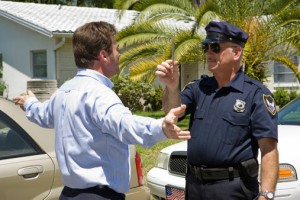Advice about your rights from an expert DUI defense attorney in Orange County California

- Fumbling with your license and registration
- A smell of alcohol
- Alcohol, drugs, or drug paraphernalia in the vehicle
- Physical signs of impairment like slurred speech or watery eyes
There Are 3 Standardized Field Sobriety Tests
Field sobriety tests are physical and mental exercises designed to help police officers gauge impairment. There are many types of tests, but only 3 of them have been recommended by the National Highway Transportation Safety Administration (NHTSA) for use by law enforcement officials. These tests are the horizontal gaze nystagmus test, the walk & turn test, and the one-leg stand test.
Field Sobriety Tests are Unreliable
According to the NHTSA’s own studies, even the most accurate field sobriety test is only 77 percent effective in identifying individuals whose blood alcohol is over .10. And that’s assuming the test is properly administered in ideal conditions by an impartial officer.
You Can Refuse to Take Field Sobriety Tests
Often, a police officer has already decided whether or not they’re going to arrest you for DUI before asking you to perform a field sobriety test. Taking the test and failing will only serve to build up the evidence against you. Politely refusing to take the test, however, has no legal penalty in the state of California. That’s why any good DUI defense attorney in Orange County California would advise drivers not to comply with this testing.
You Can Refuse PAS Testing Onsite
A police officer may ask you to comply with preliminary alcohol screening (PAS) testing when they stop your vehicle. Unless you are under 21 or are on probation for a previous DUI, you do not have to submit to this testing. Again, there is no point in helping the police to create more evidence against you.
You Must Take a Chemical Test if Arrested
If you are arrested for DUI, you must take a breathalyzer test or blood test when you get to the police station. Refuse testing at this point and you will probably have your license suspended for a year, and if you are convicted of DUI this refusal may affect your sentencing.
Test Results Can Be Challenged by Your DUI Defense Attorney in Orange County California
If you are arrested for DUI, don’t worry. Your DUI defense attorney in Orange County California has plenty of options for challenging the results of any field sobriety tests, blood tests, or breath tests you may have failed. For example, field sobriety tests can be questioned on any of the following grounds:
- You are over 60, have any physical or mental impairments, were exhausted or on medication
- The police officer moved or distracted you during the test
- You were wearing restrictive clothing
- The officer didn’t time the test correctly
- Environmental conditions were unfair (bad weather, poor lighting, uneven ground, excess noise)
- Non-standardized testing was used
- Instructions were vague or incorrect
- The test was administered at a DUI checkpoint and checkpoint guidelines were violated
Your DUI defense attorney can also challenge blood and breath tests on the grounds that equipment malfunction, administration error, or a medical condition caused a false positive.




